怎样学好高中英语作文
如何学好英语英语作文(6篇)
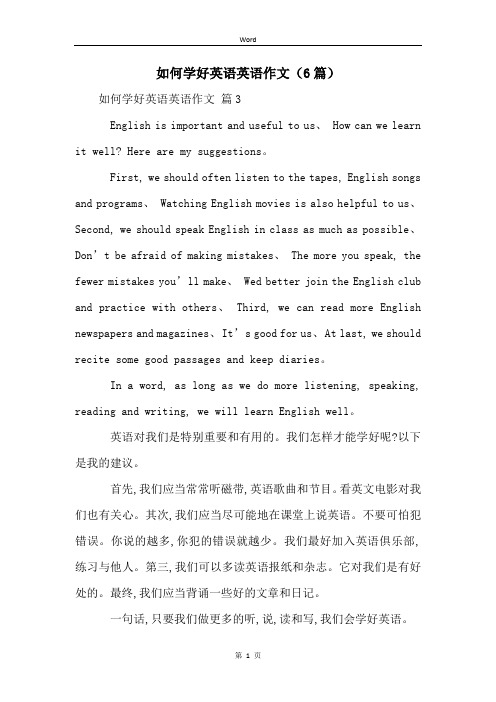
如何学好英语英语作文(6篇)如何学好英语英语作文篇3English is important and useful to us、 How can we learn it well? Here are my suggestions。
First, we should often listen to the tapes, English songs and programs、 Watching English movies is also helpful to us、Second, we should speak English in class as much as possible、Don’t be afraid of making mistakes、 The more you speak, the fewer mis takes you’ll make、 Wed better join the English club and practice with others、 Third, we can read more English newspapers and magazines、It’s good for us、 At last, we should recite some good passages and keep diaries。
In a word, as long as we do more listening, speaking, reading and writing, we will learn English well。
英语对我们是特别重要和有用的。
我们怎样才能学好呢?以下是我的建议。
首先,我们应当常常听磁带,英语歌曲和节目。
看英文电影对我们也有关心。
其次,我们应当尽可能地在课堂上说英语。
不要可怕犯错误。
你说的越多,你犯的错误就越少。
我们最好加入英语俱乐部,练习与他人。
第三,我们可以多读英语报纸和杂志。
如何学好英语方法英语作文
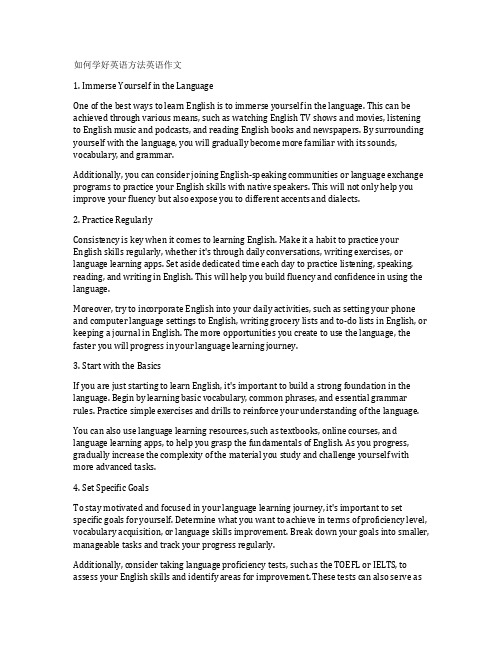
2015年各市高考语文语言文字运用题人教版高三总复习2015新课标1语文:适用地区:河南河北山西江西陕西五、语言文字运用(20分)13.依次填入下列各句横线处的成语,最恰当的一组是:1.这正是经验丰富的主教练在战术安排上的.......之处:下半场比赛中想方设法消耗对方主力队员的体力,终于扭转劣势,赢得比赛。
2.经过几天的.....,又和病人家属做了充分沟通,吴医生最终否定了治疗小组提出的保守治疗方案,决定尽快为病人进行肺部手术。
3.早在上个世纪末,当地决策者就.....,提出了从单一的小农业向大农业转移的战略措施,于是一个个生态经济园区应运而生。
A.老谋深算..深谋远虑..深思熟虑...B。
深思熟虑..老谋深算..深谋远虑..C.老谋深算..深思熟虑..深谋远虑...D。
深谋远虑...深思熟虑..老谋深算....14.下列各句中,没有语病的一句是A.为纪念抗日战争暨世界反法西斯战争胜利70周年,从现在起到年底,国家大剧院宣布承办31场精心策划的演出。
B。
根据国宝统计局发布的数据,4月份我国居民消费价格指数出现自去年12月以来的最大的涨幅,但仍低于相关机构的预测。
. C.这部小说中的“边缘人”是一个玩世不恭、富有破坏性却真实坦白的群体,人们面对这类形象时会引起常常的思索。
...D.为进一步保障15.填入下面一段文字横线处的语句,最恰当的一句是随着雾霾频发,油品质量对环境的影响引起了人们越来越多的关注,有测试表明,一些城市空气中PM2.5的20%左右来自机动车尾气,而只要使用符合新标准的汽油和柴油,......。
有鉴于此,我国将加快促进成品油质量升级国家专项行动。
A..即使现有汽车不作任何改造,其尾气中相关污染物的排放也能减少10%B。
.汽车尾气中相关污染物的排放就可减少10%,现有汽车的改造并不是必须的C...再加上对现有汽车进行改造,其尾气中相关污染物的排放就将减少10%以上D.不管是否改造现有汽车,其尾气中的相关污染物排放都将减少10%16.在下面横线处补写恰当的语句,使整段文字语意完整连贯,内容贴切,逻辑严密,没出不超过15个字(5分)电子商务存在的价值之一,就是通过互联网进行网上购物,网上支付,节省消费者与商家的时间和空间,_______①______。
如何学好英语的英语作文高一
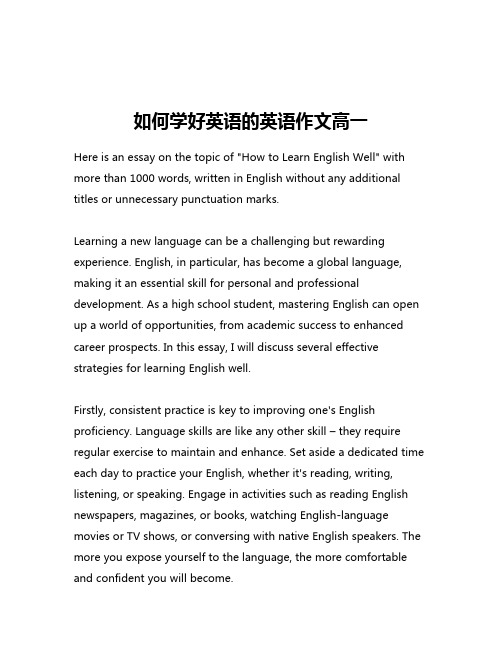
如何学好英语的英语作文高一Here is an essay on the topic of "How to Learn English Well" with more than 1000 words, written in English without any additional titles or unnecessary punctuation marks.Learning a new language can be a challenging but rewarding experience. English, in particular, has become a global language, making it an essential skill for personal and professional development. As a high school student, mastering English can open up a world of opportunities, from academic success to enhanced career prospects. In this essay, I will discuss several effective strategies for learning English well.Firstly, consistent practice is key to improving one's English proficiency. Language skills are like any other skill – they require regular exercise to maintain and enhance. Set aside a dedicated time each day to practice your English, whether it's reading, writing, listening, or speaking. Engage in activities such as reading English newspapers, magazines, or books, watching English-language movies or TV shows, or conversing with native English speakers. The more you expose yourself to the language, the more comfortable and confident you will become.Secondly, immerse yourself in the language as much as possible. Surround yourself with English-language media, such as music, podcasts, or social media. Try to think in English, even if it's just for short periods of time. The more you can integrate English into your daily life, the more natural it will become. Additionally, consider finding a language partner or joining an English conversation club to practice your speaking skills in a supportive and interactive environment.Thirdly, focus on building a strong vocabulary. Expanding your vocabulary is essential for improving your overall language proficiency. Dedicate time each day to learning new words, their meanings, and how to use them in context. Utilize various resources, such as flashcards, vocabulary apps, or online tools, to make the learning process more engaging and effective. Additionally, pay attention to common idioms, phrasal verbs, and colloquial expressions, as these are crucial for authentic and natural-sounding communication.Fourthly, develop a solid understanding of English grammar. While vocabulary is important, proper grammar is the foundation for effective communication. Study the various grammatical structures, such as verb tenses, sentence structures, and parts of speech, and practice applying them in your writing and speaking. Utilize grammartextbooks, online resources, or even engage in grammar exercises to reinforce your understanding.Fifthly, practice writing regularly. Writing is an essential skill for academic and professional success, and it can also help you improve your overall language proficiency. Set aside time each day to write, whether it's journaling, composing emails, or practicing essay writing. Pay attention to your sentence structure, word choice, and organization, and seek feedback from teachers or language partners to identify areas for improvement.Sixthly, embrace mistakes and learn from them. Learning a new language can be a humbling experience, and it's important to understand that making mistakes is a natural part of the learning process. Instead of being discouraged by errors, view them as opportunities to learn and grow. Seek feedback from teachers or language partners, and use it to identify areas that need more attention. Celebrate your progress, no matter how small, and stay motivated to continue improving.Finally, find ways to make learning English enjoyable. Language learning can be challenging, but it can also be a fulfilling and rewarding experience. Engage in activities that you find interesting or enjoyable, such as reading your favorite books in English, watching movies in the language, or participating in English-language clubs orevents. By making the learning process more enjoyable, you'll be more likely to stick with it and see long-term progress.In conclusion, learning English well requires a multifaceted approach that combines consistent practice, immersion, vocabulary building, grammar study, writing exercises, and a positive mindset. By incorporating these strategies into your language learning journey, you can develop the skills and confidence needed to communicate effectively in English, both in academic and professional settings. Remember, learning a new language is a lifelong process, so be patient, persistent, and celebrate your successes along the way.。
关于怎样学好英语英语作文范文(精选16篇)
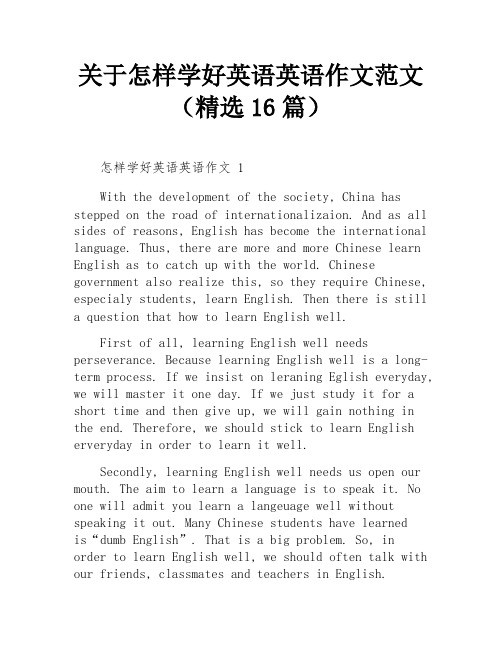
关于怎样学好英语英语作文范文(精选16篇)怎样学好英语英语作文 1With the development of the society, China has stepped on the road of internationalizaion. And as all sides of reasons, English has become the international language. Thus, there are more and more Chinese learn English as to catch up with the world. Chinese government also realize this, so they require Chinese, especialy students, learn English. Then there is still a question that how to learn English well.First of all, learning English well needs perseverance. Because learning English well is a long-term process. If we insist on leraning Eglish everyday, we will master it one day. If we just study it for a short time and then give up, we will gain nothing in the end. Therefore, we should stick to learn English erveryday in order to learn it well.Secondly, learning English well needs us open our mouth. The aim to learn a language is to speak it. No one will admit you learn a langeuage well without speaking it out. Many Chinese students have learnedis“dumb English”. That is a big problem. So, inorder to learn English well, we should often talk with our friends, classmates and teachers in English.Thirdly, the best way to master a language is tobe personally on the scene. So I advice those people who have condition go abroad for a while. When they come back home, their oral English must have improved.To sum up, learning English well is not easy. But we can take masures to make it done through perseverance, talking and going abroad.随着社会的发展,中国已经踏上了国际化的道路。
英语作文关于如何学好英语建议信范文
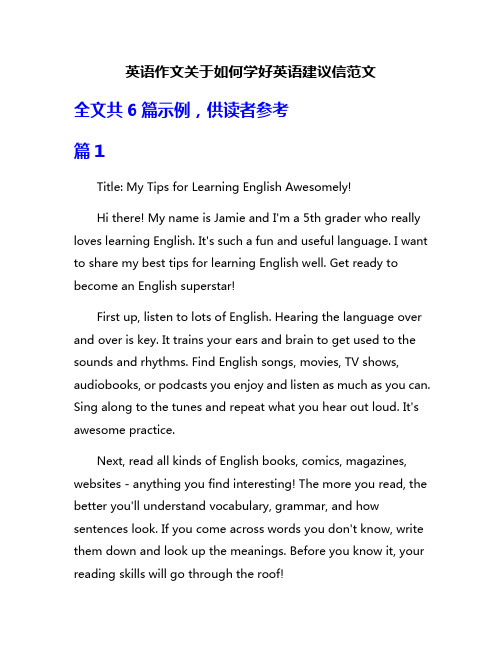
英语作文关于如何学好英语建议信范文全文共6篇示例,供读者参考篇1Title: My Tips for Learning English Awesomely!Hi there! My name is Jamie and I'm a 5th grader who really loves learning English. It's such a fun and useful language. I want to share my best tips for learning English well. Get ready to become an English superstar!First up, listen to lots of English. Hearing the language over and over is key. It trains your ears and brain to get used to the sounds and rhythms. Find English songs, movies, TV shows, audiobooks, or podcasts you enjoy and listen as much as you can. Sing along to the tunes and repeat what you hear out loud. It's awesome practice.Next, read all kinds of English books, comics, magazines, websites - anything you find interesting! The more you read, the better you'll understand vocabulary, grammar, and how sentences look. If you come across words you don't know, write them down and look up the meanings. Before you know it, your reading skills will go through the roof!Another big tip is to practice speaking and having conversations every chance you get. English is meant to be spoken, so use it! Talk to yourself, read out loud, or find a language partner to chat with. At first, speaking can feel scary, but the more you do it, the more natural and comfortable it will become. Don't be afraid to make mistakes - that's how you learn!Here's a super important one: Get creative and have fun with English! Make up silly songs or raps using new vocab words. Act out stories you've read or write new ones. Keep a journal about your day entirely in English. The possibilities are endless. When learning is enjoyable, you'll pick it up so much faster.Write lots of English too! Start with simple sentences about your life and gradually work up to longer paragraphs and stories. Check your writing for errors and have others give you feedback. The more you write, the better you'll get at expressing yourself clearly.Don't forget to study the grammar and vocabulary too. Learn new words every day by making flashcards or word lists. Study grammar rules and do practice exercises. But don't just read and memorize - use the new words and grammar in your own speaking and writing right away!Another top tip is to immerse yourself in English as much as possible. Put yourself in situations where you have to use and think in English. Watch TV without subtitles, change your phone's language to English, or find a pen pal to write to. The more you surround yourself with English, the quicker you'll learn.Finally, and this one is really important: Be patient with yourself and don't get discouraged! Learning a new language takes an enormous amount of time and effort. Some days will be discouraging when the words don't come easy. But stick with it! Celebrate your small wins and trust that you're making progress. Have confidence and keep practicing. You've got this!Those are my top tips for leveling up your English in an awesome way. Use them faithfully and before long, you'll be an absolute pro! English is an amazing adventure full of new worlds to discover. So let's explore together and have tons of fun mastering this incredible language!篇2Title: My Journey to English MasteryHey there, fellow students! I know learning English can be a real challenge, but trust me, with the right mindset and some handy tips, it can be an exciting adventure. Let me share with youmy personal journey and the strategies that have helped me conquer this language like a boss!It all started when I was just a little kid, barely able to tie my own shoelaces. My parents, being the awesome people they are, introduced me to the world of English through fun cartoons and rhymes. At first, I'll admit, it sounded like gibberish to me, but as time passed, those catchy tunes and vibrant animations helped me pick up basic words and phrases without even realizing it. That's when I learned my first lesson: making learning enjoyable is the key to staying motivated.As I entered elementary school, English lessons became a part of my daily routine. I won't lie, there were times when I felt like giving up, especially when it came to grammar rules and vocabulary lists. But then, my brilliant teacher showed me a trick that changed everything – using visuals and stories to remember new words and concepts. Suddenly, learning English became an adventure, with each new word being a treasure to unlock the mysteries of this fascinating language.One of the most significant challenges I faced was pronunciation. Those pesky vowels and consonant combinations made my tongue twist like a pretzel. But you know what helped me? Listening to English songs, audiobooks, and movies! Byconstantly exposing my ears to native speakers, I slowly but surely improved my pronunciation and developed a better understanding of the language's rhythm and intonation.Another game-changer for me was finding a study buddy or two. We would practice conversations, play word games, and even create our own little English club. Having friends who shared the same goal made the learning process more fun and accountable. We motivated and challenged each other, turning English lessons into a friendly competition.As I progressed through the grades, I discovered the magic of reading. English books and stories opened up entire worlds for me, introducing me to new ideas, cultures, and perspectives. Not only did reading improve my vocabulary and comprehension, but it also fueled my imagination and creativity.I began to see English not just as a subject to study, but as a gateway to endless possibilities.I also realized the importance of putting my knowledge into practice. Whether it was writing short stories, participating in classroom discussions, or joining an English club, every opportunity to actively use the language helped solidify my skills. It's like riding a bicycle – the more you practice, the more confident and natural you become.Now, as I approach the end of my elementary school journey, I can proudly say that I have come a long way in my English mastery. It hasn't been an easy path, but the rewards have been well worth the effort. English has become more than just a subject; it's a tool that has opened doors to new friendships, opportunities, and a deeper understanding of the world around me.So, my dear friends, if you're struggling with English like I once did, don't lose hope. Embrace the challenges, find what works best for you, and most importantly, have fun with the process. English is not just a language; it's a passport to endless adventures and discoveries. Trust me, the journey is worth taking, and the destination is truly rewarding.Happy learning, and remember, you've got this!篇3Title: My Tips for Becoming an English Superstar!Hi friends! My name is Jamie and I'm a 5th grade student. Like many of you, English is not my first language, but I've worked really hard and now I'm one of the top English students in my class. Today, I want to share my secrets on how you can become an English superstar too!First off, let's talk about vocabulary. Building a strong vocabulary is like giving your brain a bigger toolbox to work with. The more words you know, the better you can express yourself and understand what others are saying. My favorite way to learn new words is by reading, reading, and reading some more! Whenever I come across an unknown word, I write it down and look up the definition. Then I try to use that word in my writing or speaking as much as possible until it really sticks.Another fantastic way to pick up vocabulary is by watching movies, TV shows, or YouTube videos in English. At first, you may need subtitles in your language to follow along. But as you get better, try watching without subtitles and just letting the English wash over you. You'll be surprised how many words you can pick up through context clues!Speaking of context, that brings me to my next tip: immerse yourself in English as much as possible! The more you surround yourself with the language, the faster it will start to feel natural. At home, I change my phone and computer settings to English. I also listen to English music, podcasts, or audiobooks during free time. Basically, any chance I get to expose my brain to more English input, I take it!When it comes to actually practicing your English skills, conversation is key. It can be scary at first to speak up, but the more you do it, the more comfortable you'll become. If you can, find a friend who is also learning English and practice conversing with each other. You can take turns being the speaker and listener. If you get stuck on a word, don't be afraid to use body language or describe what you mean another way. The important thing is keep that conversation flowing!For writing practice, I like to keep an English journal or start a blog. At the beginning, my entries were really simple, just describing my day or thoughts. But over time, as my skills improved, I started experimenting with more complex sentences and vocabulary words I had learned. Having an audience (even if it's just your future self!) can be really motivating to keep writing.Grammar is probably the trickiest part of learning any new language. There are so many rules to memorize! My best advice is to take it step-by-step and be patient with yourself. English grammar doesn't always follow logic, so you kind of just have to drill those rules into your brain through repetition. Make grammar practice as fun as possible by turning it into games, watching short videos explaining the concepts, or even making up silly songs to remember the rules.Finally, don't let mistakes discourage you! Even native English speakers make errors sometimes. The most important thing is that you keep trying and learning from your mistakes. If someone corrects you, be thankful, because that's how you'll improve. Celebrate your progress, no matter how small. Every new English word or phrase you master is a step towards becoming fluent.Well, those are my top tips for learning English! It takes a lot of hard work and dedication, but it's SO worth it to be able to communicate in this incredibly useful global language. If an English-learner like me can do it, you can too. So keep practicing, keep having fun with it, and I'll see you on the road to becoming an English superstar!篇4How to Become an English MasterHi there! My name is Emma, and I'm a 10-year-old girl who loves learning English. I know it can be tough sometimes, but I've picked up a few tricks that have really helped me along the way. Are you ready to become an English master like me? Let's get started!First things first, you need to make English a part of your daily life. It's not enough to just study it in school. You have to surround yourself with the language as much as possible. One way to do this is by listening to English music, watching English movies or TV shows, and reading English books or comics. Even if you don't understand everything at first, keeping your ears and eyes exposed to the language will help it sink in over time.Another important thing is to practice, practice, practice! The more you use English, the better you'll get. Don't be afraid to make mistakes – that's how we learn! Speak English with your friends, family, or even to yourself when you're alone. You can also join an English club at school or in your community, where you can practice with other students.One of my favorite ways to practice is by keeping an English journal. Every day, I write down new words I've learned, interesting phrases I've heard, or just anything that's on my mind. It's a great way to work on your writing skills, and you can look back at your old entries to see how much you've improved over time.Speaking of new words, it's really helpful to keep a vocabulary notebook or flashcards. Whenever you come across a word you don't know, write it down along with its definition andan example sentence. Then, review your notebook or flashcards regularly to help those new words stick in your brain.Don't forget about grammar, either! Learning the rules of English grammar can seem boring, but it's important for putting sentences together correctly. Try to make it fun by playing grammar games or doing exercises that involve writing silly stories or jokes.Another great way to improve your English is by finding a pen pal or language partner. You can write letters or emails back and forth, or even chat with them online or over the phone. Having a real person to communicate with will make practicing English feel more natural and exciting.If you ever feel stuck or discouraged, don't give up! Learning a new language is hard work, but it's also really rewarding. Celebrate your progress, no matter how small, and be patient with yourself. You're doing great!Oh, and one more thing – don't be afraid to ask for help when you need it. Your teachers, parents, or older siblings can offer guidance and support. You can also look for resources like English learning websites, apps, or tutoring services.Well, those are my top tips for becoming an English master. Just remember to keep a positive attitude, have fun with it, and never stop practicing. Before you know it, you'll be speaking, reading, and writing English like a pro! Good luck, and happy learning!篇5Dear Friend,Learning English can be a lot of fun, but it also takes hard work. Since you asked me for some tips, I'll share what has helped me along the way. I'm still learning, but these ideas have really made a difference!First, read as much as you can in English. Reading is like a workout for your brain – the more you do it, the stronger you'll get. Start with easy books or comics that you enjoy, even if they seem a bit babyish at first. As you read more, you'll pick up new words and get used to how sentences are put together. Pretty soon, you'll be ready for harder books!Another great way to learn is by listening. Watch movies or TV shows in English, or look for audiobooks you can listen to. At first, you might not understand everything, but that's okay! Payattention to the sounds and rhythms of the language. The more English you hear, the easier it will become.Speaking is important too. It might feel weird at first, but practice makes perfect! Try reading aloud to yourself, or find a friend who's also learning English so you can chat together. You could even talk to yourself or your stuffed animals when no one's around. The more you use the language, the more comfortable you'll become.Writing is another skill you'll need to work on. Start a journal and write a little bit each day, even if it's just a few sentences about your day. Or write letters to an imaginary pen pal. When you're ready, ask your teacher to check your writing and suggest ways to improve.Don't be afraid to make mistakes! That's how we all learn. If you mess up a word or say something the wrong way, don't get discouraged. Just make a note of it and keep practicing. Mistakes are proof that you're trying, and that's awesome.One thing that has really helped me is finding English media I really enjoy. I love reading the Dog Man comics and watching Pokemon shows. When you like what you're reading or watching, it makes learning feel more like fun than work.Speaking of fun, there are lots of cool apps and games for practicing English these days. Ask your parents or teacher to help you find some good ones to download. Playing language games is a great way to pick up vocabulary without even realizing it.Having the right learning materials is important too. A good dictionary can be super helpful when you come across words you don't know. And workbooks with exercises and quizzes will give you chances to practice different skills.But the most important thing of all is to not give up! Learning a new language takes time and patience. There will be days when it feels really hard. That's normal – everyone goes through ups and downs. Just keep at it, little by little, day by day. As long as you don't quit, you'll make progress.One last tip: make learning English a part of your daily routine. Maybe you could read for 20 minutes each morning, and do a language exercise after school. Or watch an English TV show while eating breakfast. The more you immerse yourself in the language, the faster you'll improve.So those are my suggestions! I know it's a lot to remember, but the key ideas are:Read, listen, speak, and write as much as you canFind English media you genuinely enjoyUse apps, games, workbooks, dictionaries, and other good learning toolsDon't be afraid to make mistakes – that's how you learn!Be patient, stick with it, and make English part of your daily lifeLearning a language is a marathon, not a sprint. If you keep putting in the effort, you'll be amazed at how much progress you can make! Just don't get discouraged, and remember to have fun with it.Let me know if any of these tips are confusing or if you need any other advice. I'm rooting for you!Your friend,[Your name]篇6How to Be a Super English LearnerHi friends! My name is Emma and I'm going to share some tips with you on how to become a total English superstar. I've been learning English since I was really little and now I'm one ofthe best students in my class. It wasn't always easy, but I kept practicing and never gave up. If you follow my advice, I'm sure you'll get amazing at English too!The most important thing is to have fun while you're learning. English can be really hard with all the crazy spelling rules and vocabulary to remember. But if you enjoy it and play games to practice, it won't feel like work at all. One of my favorite ways to learn is by singing along to English songs and watching movies and TV shows in English. The stories are so interesting and the characters speak in a way that's easy for kids to understand. I've learned tons of new words and expressions from all the English media I consume.Another really good tip is to read, read, read as much as you can! Start with simple books and comics since the language will be easier. As you get better, you can move on to longer chapter books and novels. Reading is an awesome way to learn new vocabulary in context and it helps your comprehension skills a lot. My parents started reading English bedtime stories to me when I was a baby so I got used to hearing the language from a very young age. Whenever you read, make sure you have a dictionary nearby so you can quickly look up any words you don't know.Don't be afraid to make mistakes when speaking English - that's how we learn! It can feel embarrassing at first, but the more you practice conversations, the more natural it will start to feel. My English teacher is always telling us to raise our hands and participate as much as possible during class. You could also find a language partner to chat with online or join an English club at school. The more you speak out loud, the better your pronunciation will become.Here are some other quick tips that have helped me a ton:• Keep an E nglish vocabulary journal and write down new words you learn along with sample sentences• Listen to English podcasts and audiobooks made for kids - it's great listening practice• Play word games and apps to build your English skills• Be curi ous and try to learn English words for things you're interested in like sports, animals, technology etc.• Don't get discouraged! Learning a new language is super hard but also really coolEnglish has opened up so many opportunities for me already.I can read awesome books and understand movies from around the world. I can make friends with kids from other countries. Andsomeday I'll be able to travel and talk to people anywhere! English is a powerful skill that will help you out so much in life.I really hope these tips give you the confidence to take your English abilities to new levels. Just remember to study hard, practice as much as possible, and most importantly - have fun with it! Learning English is an exciting journey of discovering a whole new language and culture. Trust me, when you finally become fluent, it'll feel absolutely amazing. You've got this!。
学好英语的三种方法,英语作文
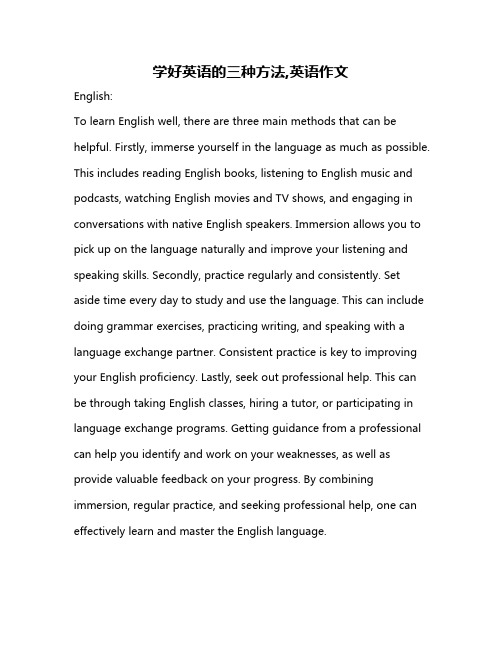
学好英语的三种方法,英语作文English:To learn English well, there are three main methods that can be helpful. Firstly, immerse yourself in the language as much as possible. This includes reading English books, listening to English music and podcasts, watching English movies and TV shows, and engaging in conversations with native English speakers. Immersion allows you to pick up on the language naturally and improve your listening and speaking skills. Secondly, practice regularly and consistently. Set aside time every day to study and use the language. This can include doing grammar exercises, practicing writing, and speaking with a language exchange partner. Consistent practice is key to improving your English proficiency. Lastly, seek out professional help. This can be through taking English classes, hiring a tutor, or participating in language exchange programs. Getting guidance from a professional can help you identify and work on your weaknesses, as well as provide valuable feedback on your progress. By combining immersion, regular practice, and seeking professional help, one can effectively learn and master the English language.中文翻译:要学好英语,有三种主要方法可以帮助。
高一怎样把学好英语作文
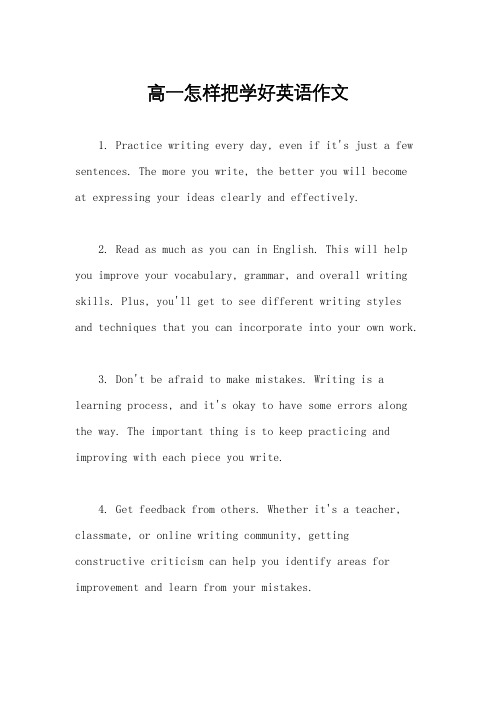
高一怎样把学好英语作文1. Practice writing every day, even if it's just a few sentences. The more you write, the better you will become at expressing your ideas clearly and effectively.2. Read as much as you can in English. This will help you improve your vocabulary, grammar, and overall writing skills. Plus, you'll get to see different writing styles and techniques that you can incorporate into your own work.3. Don't be afraid to make mistakes. Writing is a learning process, and it's okay to have some errors along the way. The important thing is to keep practicing and improving with each piece you write.4. Get feedback from others. Whether it's a teacher, classmate, or online writing community, gettingconstructive criticism can help you identify areas for improvement and learn from your mistakes.5. Experiment with different genres and topics. Writing about a variety of subjects will not only keep things interesting for you, but also help you develop versatility in your writing style.6. Pay attention to sentence structure and paragraph organization. Clear and concise writing is key to making your ideas easy to understand and engaging for the reader.7. Take breaks when needed. Sometimes stepping away from your writing for a bit can help you come back with a fresh perspective and new ideas.8. Set goals for yourself. Whether it's writing a certain number of words per day or completing a specific writing task, having goals can help keep you motivated and focused on improving your English writing skills.。
如何学好高中英语英文作文

如何学好高中英语英文作文Learning English writing in high school can be challenging, but there are a few key strategies that can help you improve. One important thing to remember is to read as much as possible in English. This will help you become familiar with different writing styles and expand your vocabulary.Another important aspect of learning to write well in English is to practice regularly. Set aside time each day to write, whether it's journaling, writing short stories, or even just composing emails in English. The more you practice, the more comfortable and confident you will become with expressing yourself in written English.It's also helpful to seek feedback on your writing. This can come from your English teacher, classmates, or even online writing communities. Constructive criticism can help you identify areas for improvement and learn from your mistakes.When writing in English, pay attention to grammar and sentence structure. Make sure to use a variety of sentence types and lengths to keep your writing interesting and engaging. Additionally, try to incorporate different vocabulary words and phrases to avoid repetition and make your writing more dynamic.Lastly, don't be afraid to take risks with your writing. Experiment with different styles, tones, and topics to find your unique voice as a writer. Writing in English can be a creative and rewarding experience, so don't be afraid tolet your personality shine through in your writing.。
- 1、下载文档前请自行甄别文档内容的完整性,平台不提供额外的编辑、内容补充、找答案等附加服务。
- 2、"仅部分预览"的文档,不可在线预览部分如存在完整性等问题,可反馈申请退款(可完整预览的文档不适用该条件!)。
- 3、如文档侵犯您的权益,请联系客服反馈,我们会尽快为您处理(人工客服工作时间:9:00-18:30)。
怎样学好高中英语作文
要想在25满分的作文中的到17+的分数还是有高级句型和重要短语的使用的。
一些英语上稍有欠缺的学生不要因为看到高级两字就望而却步。
有些高级句式是可以背诵的,只要够勤奋背熟练了,再巧妙运用到作文中就可。
以下便是巧用句式的例子
一般适合学生的通用句式有例如,句子开头:there is no doubt that;there is an undenying fact that;it can be said without exaggeration that……(可加The double ninth festival is one of the traditional festival in China),
句子连接处:what is more,in addition,in the other hand……
句子结尾:last but not least ,in a word,in short省略号,
当然如果能用倒装句,not only but also等句型也是极好的,前提是你不会写错。
1.结构就是你打算分几段写,每段都写什么?哪段转哪段承哪段起合?心里都要是有谱的。
2.关键词:结构拟定后,迅速在草稿纸上写下自己这篇作文可能用到的一些关键词。
包括一些漂亮的词和自己可能会忘记的词。
主要是动词和名词。
譬如一省作文题:假设你的名字是李华,亚洲冬季运动会将在你居住的地方举办,现招募志愿者。
你希望成为志愿者。
申请信的格式已经写好了,你直接写内容就可以。
你的个人情况:年龄性别学历,个人条件。
英语好,爱好体育,擅长交际,乐于助人。
承诺提供最佳服务。
3.句式:词写下来了,其实你构建这篇作文的建筑材料就到位了,下步就是要把
它们盖成漂亮的作文。
先用最普通的陈述句把它们在头脑中过一遍,然后看看都能改成什么句式。
能不能把一句陈述句改成问句?能不能用上一个双重否定句?能不能用一个主语从句套定语从句的长句?能不能用一个插入语?等等。
把你高中三年的英语积累展示出来。
在草稿纸上同样标注。
